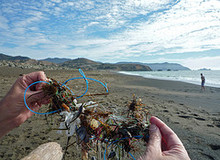 The scientists at the Bulletin of Atomic Scientists set the hand back on the Doomsday Clock from 5 minutes to midnite to 6 minutes to midnite. That's big. The Atomic Scientists was an organization established in 1946 by the scientists who had been responsible for building the bombs that destroyed Nagasaki and Hiroshima. The Bulletin scientists are aiming for a world free of nuclear weapons. The minute hand hovered at one or two minutes to midnite for most the decades of the cold war. The scientists moved the hands now because they saw signs of cooperation amongst leaders of the nuclear states to reduce arsenals and secure all nuclear bomb-making material. In addition, also for the first time ever, "industrialized and developing countries alike are pledging to limit climate-changing gas emissions that could render our planet nearly uninhabitable".
The scientists at the Bulletin of Atomic Scientists set the hand back on the Doomsday Clock from 5 minutes to midnite to 6 minutes to midnite. That's big. The Atomic Scientists was an organization established in 1946 by the scientists who had been responsible for building the bombs that destroyed Nagasaki and Hiroshima. The Bulletin scientists are aiming for a world free of nuclear weapons. The minute hand hovered at one or two minutes to midnite for most the decades of the cold war. The scientists moved the hands now because they saw signs of cooperation amongst leaders of the nuclear states to reduce arsenals and secure all nuclear bomb-making material. In addition, also for the first time ever, "industrialized and developing countries alike are pledging to limit climate-changing gas emissions that could render our planet nearly uninhabitable". They go on:
These unprecedented steps are signs of a growing political will to tackle the two gravest threats to civilization--the terror of nuclear weapons and runaway climate change. This hopeful state of world affairs leads the boards of the Bulletin of the Atomic Scientists--which include 19 Nobel laureates--to move the minute hand of the Doomsday Clock back from five to six minutes to midnight. By shifting the hand back from midnight by only one additional minute, we emphasize how much needs to be accomplished, while at the same time recognizing signs of collaboration among the United States, Russia, the European Union, India, China, Brazil, and others on nuclear security and on climate stabilization.I can understand why people are frustrated with President Obama. What I always say to people is "Watch what is happening two and three layers down, the things that don't get all that much press." It takes years to push changes out far enough to make a difference. This is an example of what is happening in every agency, some faster than others. There has been little in the news about this cooperation between Obama and other world leaders, but clearly, it is occurring and occurring because of who Obama is, his style of leadership and his commitment to what he called the most important world issue - securing and limiting nuclear weapons.
The post at DailyKos, by Plutonium Page, goes on to ask Richard Rhodes, an "atomic historian" of the highest order, and the Pulitzer Prize-winning author of "The Making of the Atomic Bomb" about why, if this is so important the hands were not set back more. His answer:
The real offender in terms of nuclear arsenals, without any question, is the United States of America. That's something we could do something about. I know the President is trying to move in that direction.Plutonium Page goes on to say that there is already tremendous push-back from the atomic-industrial complex because they will lose money. They will be yelling that we need these bombs for our safety. Just watch them. If the healthcare reform campaign has taught me anything it is that the forces arrayed against us the people are ferocious. And they are not accustomed to losing.







